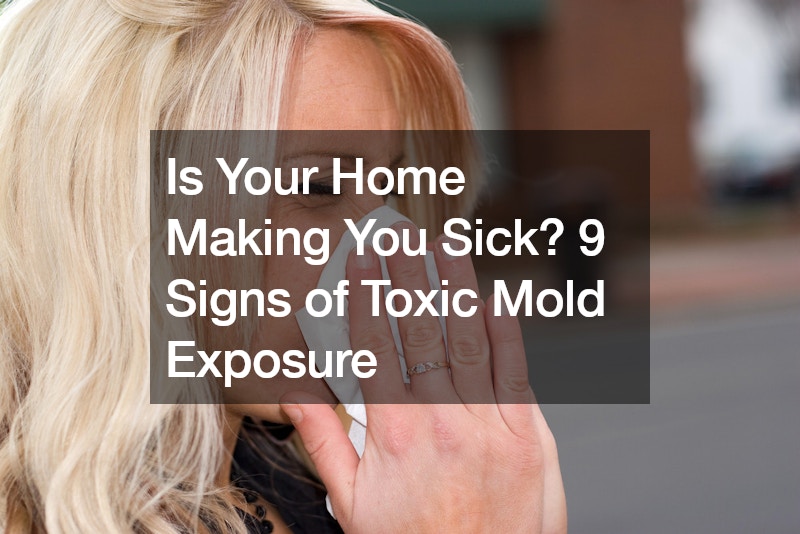Your home should be a haven, a place of comfort and relaxation. But what if your sanctuary is silently making you sick? Mold, a common household enemy, can thrive in damp environments and release harmful spores and toxins that can negatively impact your health. While not everyone is susceptible, for those who are, mold exposure can lead to a variety of unpleasant symptoms.
If you’ve been experiencing unexplained health problems and suspect mold might be the culprit, here are 9 signs to watch out for:
- A Musty Odor: Mold often announces its presence with a distinctive musty smell. This odor can be earthy, pungent, or even slightly sweet.
If you notice a persistent unpleasant odor in your home, particularly in areas prone to moisture like basements, bathrooms, or attics, it’s crucial to investigate further. Trust your nose – a strange odor often indicates a hidden mold problem.
- Persistent Coughing: A cough that just won’t quit can be a sign of mold exposure. Mold spores can irritate the respiratory tract, triggering coughing, wheezing, and difficulty breathing. This can be particularly troublesome for those with asthma or allergies, as mold exposure can worsen existing respiratory issues.
- Unexplained Muscle and Joint Pain: Mold exposure has been linked to chronic muscle and joint pain. The mycotoxins released by certain mold varieties can trigger inflammation throughout the body, leading to aches and pains that may seem unrelated to any specific activity.
- Suspicious Stains on Walls and Ceilings: Visible mold growth is a clear sign of a mold problem. Look for discolorations, dark patches, or fuzzy growths on walls, ceilings, or around areas prone to water leaks. However, mold isn’t always visible. Even small, seemingly insignificant water stains can harbor mold growth behind surfaces like drywall. If you suspect hidden mold, consider hiring a professional mold inspection service.
- Seasonal Allergies on Steroids: Do your seasonal allergies seem worse than usual this year? Mold exposure can mimic allergy symptoms, causing itchy eyes, a runny nose, and congestion. If your allergies have become particularly troublesome, and over-the-counter medications aren’t providing relief, consider the possibility of mold lurking in your home.
- Mold and Asthma: A Problematic Mix: For those with asthma, mold exposure can be especially detrimental. Mold spores can trigger asthma attacks, leading to wheezing, shortness of breath, and chest tightness. If you have asthma and experience worsening symptoms indoors, it’s crucial to investigate potential mold problems.
- Skin Rashes and Itchy Skin: Mold allergies can manifest on the skin as well. If you’re experiencing unexplained rashes, hives, or persistent itching, it’s possible mold exposure is to blame. As tempting as it may be to scratch, resist the urge! Scratching irritated skin can worsen symptoms and increase the risk of infection.
- Memory Problems and Difficulty Concentrating: Research suggests that exposure to certain mold types can affect cognitive function. People with mold exposure may experience difficulty concentrating, forgetfulness, and even problems with memory. If you’ve noticed a decline in your cognitive abilities, consider all potential factors, including possible mold exposure in your home.
- Chronically Irritated Eyes: Red, itchy, and bloodshot eyes can be a sign of mold exposure. Mold spores can irritate the delicate membranes of the eyes, causing inflammation and discomfort. If your eyes are consistently irritated, and over-the-counter remedies aren’t providing relief, consult your doctor and mention the possibility of mold exposure in your home.
If you’re experiencing several of these symptoms, it’s wise to take action. Here are some steps you can take:
- Investigate Your Home: Look for visible signs of mold growth, particularly in moisture-prone areas.
- Improve Ventilation: Ensure proper ventilation in your home, particularly in bathrooms, kitchens, and laundry rooms. Open windows frequently to allow fresh air to circulate, and use exhaust fans when cooking or showering.
- Address Moisture Issues: Fix leaky pipes, faucets, and roofs promptly to prevent moisture buildup that can encourage mold growth. Invest in dehumidifiers to control humidity levels in your home, especially in basements and crawl spaces.
- Consider Professional Help: If you suspect a significant mold problem, consider hiring a professional mold inspection service. Professionals can identify the type of mold present, determine the extent of the problem, and recommend the best course of action for remediation. They can also provide recommendations for professional odor removal services to eliminate lingering musty smells after mold remediation is complete.
- Seek Medical Attention: If you’re experiencing health problems you suspect might be linked to mold exposure, consult your doctor. They can help diagnose the cause of your symptoms and recommend appropriate treatment.
Living Mold-Free:
Fortunately, with prompt action, you can address a mold problem and create a healthier living environment. Here are some additional tips for preventing future mold growth:
- Clean Regularly: Regularly clean bathrooms, kitchens, and other moisture-prone areas with a mold-killing solution. Pay particular attention to areas around sinks, bathtubs, showers, and toilets.
- Dry Damp Surfaces Immediately: Don’t let spills or leaks sit. Address them promptly to prevent moisture buildup that can lead to mold growth.
- Store Belongings Properly: Avoid storing belongings directly on the floor, especially in basements or crawl spaces. This can trap moisture and create a breeding ground for mold.
- Invest in Mold-Resistant Materials: When remodeling or replacing flooring or building materials, consider using mold-resistant options, especially in moisture-prone areas.
Remember, prevention is key. By taking proactive steps to control moisture levels, ensuring proper ventilation, and cleaning regularly, you can significantly reduce the risk of mold growth in your home. However, if you suspect a current mold problem, don’t hesitate to seek professional help. Addressing mold issues promptly can help safeguard your health and ensure a safe and comfortable living environment for you and your family.
.

